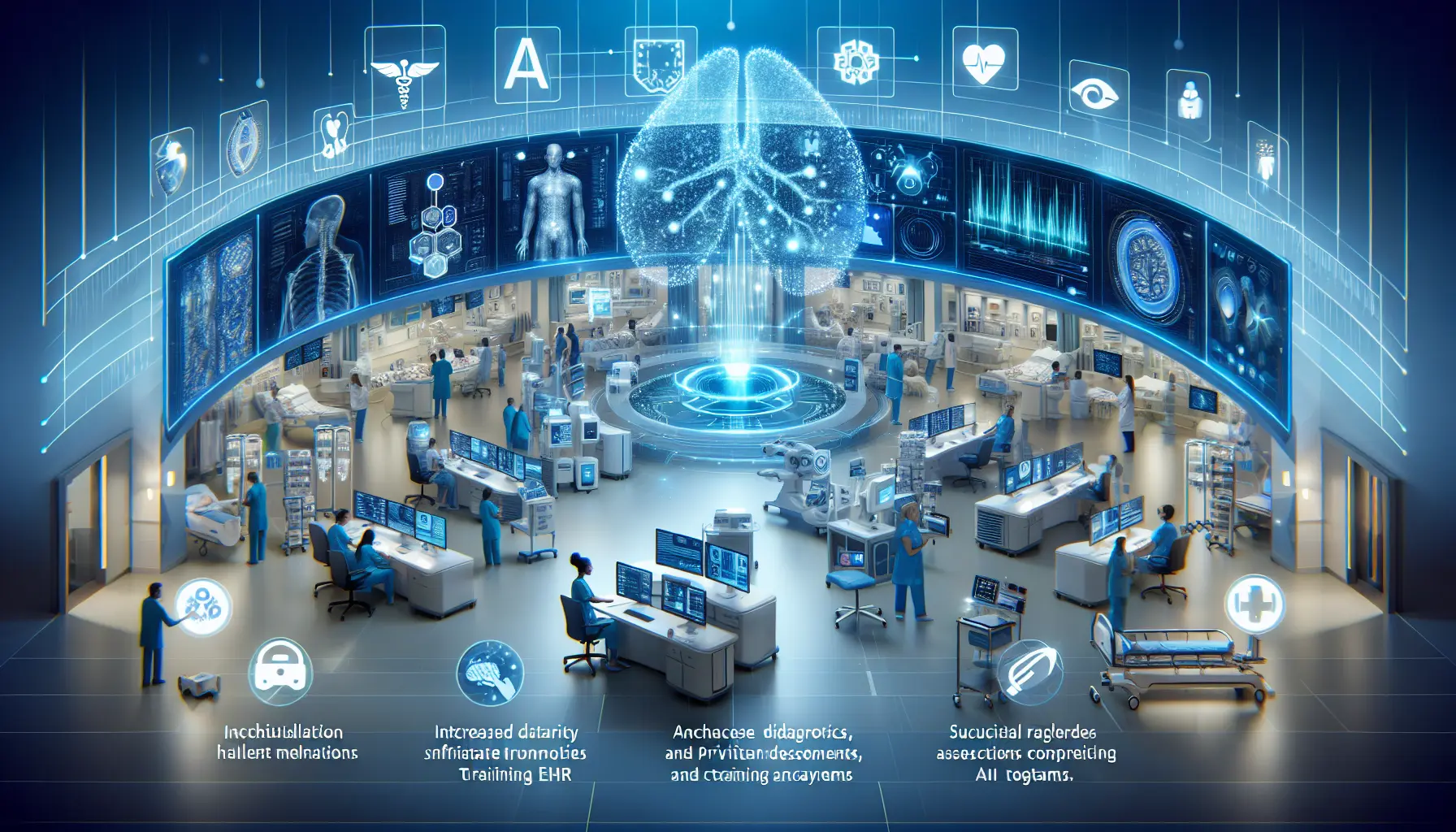
Estimated reading time: 8 minutes
Key Takeaways
- Widespread Adoption: 80% of hospitals are now using AI to enhance patient care and operational efficiency.
- Advanced Diagnostics: AI tools are significantly reducing diagnostic wait times and improving accuracy.
- Real-time Monitoring: Wearable devices powered by AI are helping to prevent critical health complications.
- Operational Efficiency: AI is streamlining administrative tasks, leading to reduced costs and errors.
- Future Trends: Expect advancements in generative AI and telehealth accessibility by 2030.
Table of Contents
- How AI is Revolutionizing Modern Healthcare
- AI Applications Transforming Hospital Operations
- Healthcare Automation Tools Streamlining Operations
- Measurable Benefits of Healthcare AI
- Current Challenges in Healthcare AI Implementation
- Future Trends in Healthcare AI
- Practical Steps for Healthcare Organizations
- Looking Ahead
- Frequently Asked Questions
How AI is Revolutionizing Modern Healthcare
Artificial intelligence has become an integral part of healthcare delivery, with approximately 80% of hospitals now implementing AI solutions to improve patient care and operational efficiency. The healthcare AI market surpassed $32 billion in 2024, reflecting widespread adoption across medical facilities worldwide.
AI Applications Transforming Hospital Operations
Advanced Diagnostic Capabilities
AI systems are reshaping medical diagnosis through sophisticated imaging and pattern recognition. The University of Cambridge recently developed an AI tool that diagnoses celiac disease within seconds, dramatically reducing diagnostic wait times and improving care delivery. Similarly, solutions from Google Health and Siemens now assist radiologists in detecting fractures and early-stage cancers with remarkable accuracy.
Real-time Patient Monitoring
Modern hospitals utilize AI-enabled wearable devices for continuous patient monitoring. These systems track vital signs and alert medical staff to potential complications before they become critical. Predictive analytics have proven particularly effective, with some facilities reporting up to 50% reduction in hospital readmissions through early intervention protocols.
Healthcare Automation Tools Streamlining Operations
Electronic Health Records Enhancement
AI technology has transformed EHR management by:
- Automating data entry and validation
- Facilitating quick information retrieval
- Generating comprehensive patient summaries
- Identifying potential drug interactions
Nearly 79% of hospitals now rely on AI-enhanced predictive modeling within their EHR systems, significantly improving clinical decision-making.
Smart Administrative Systems
Healthcare facilities are implementing AI-powered solutions for:
- Automated appointment scheduling
- Insurance claims processing
- Revenue cycle management
- Supply chain optimization
These systems reduce administrative costs while minimizing human error in critical business processes.
Measurable Benefits of Healthcare AI
Clinical Improvements
AI implementation has led to:
- Higher diagnostic accuracy rates
- Reduced time to diagnosis
- More personalized treatment plans
- Better patient outcomes
Operational Efficiency
Healthcare organizations report:
- Decreased administrative overhead
- Improved resource allocation
- Reduced waiting times
- Enhanced staff productivity
Current Challenges in Healthcare AI Implementation
Security and Privacy Concerns
Healthcare organizations must navigate strict data protection requirements while implementing AI solutions. This includes:
- HIPAA compliance measures
- Data encryption protocols
- Access control systems
- Regular security audits
Integration and Training Requirements
Success factors include:
- Comprehensive staff training programs
- Technical infrastructure updates
- Workflow optimization
- Change management strategies
Future Trends in Healthcare AI
The healthcare sector can expect:
- Advanced generative AI applications
- Improved natural language processing
- Enhanced predictive analytics
- Greater accessibility through telehealth
AI technologies will play a crucial role in achieving universal health coverage goals by 2030, particularly in addressing healthcare worker shortages and geographical disparities. Source
Practical Steps for Healthcare Organizations
To maximize AI benefits:
- Assess current technological capabilities
- Identify high-impact implementation areas
- Develop comprehensive training programs
- Monitor and measure outcomes
Looking Ahead
AI continues to transform healthcare delivery, making it more efficient, accurate, and accessible. Organizations that thoughtfully implement these technologies while addressing privacy concerns and training needs will lead the next wave of healthcare innovation.
Share your experiences with healthcare AI implementations or ask questions about specific applications in the comments below. For more information, explore our related articles on digital health transformation and medical technology trends.
Frequently Asked Questions
What are the main benefits of AI in healthcare?
AI enhances diagnostic accuracy, reduces wait times, and improves patient outcomes through personalized treatment plans.
What challenges do healthcare organizations face when implementing AI?
Challenges include data privacy concerns, integration with existing systems, and the need for staff training.
How can AI improve patient monitoring?
AI can provide real-time monitoring of vital signs, alerting healthcare providers to potential issues before they escalate.
What role does AI play in administrative tasks?
AI automates scheduling, claims processing, and data management, reducing errors and administrative costs.
What future trends should we expect in healthcare AI?
Expect advancements in generative AI, improved natural language processing, and greater telehealth accessibility.









